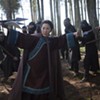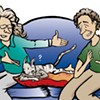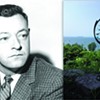Published November 12, 1997 at 4:00 a.m.
There are more horses than cows on the road from Stowe to Morrisville — Morgans, mostly, grazing with rightful dignity on pastures privy to some of the best views in Vermont. But the upscale New England landscape hardly prepares you for the odd assortment of munching mounts scattered in the field below Red Road Farm. Or the Stetson-sporting cowboy walking among them in Western-style shit-kickers who's offering words of encouragement in Lakota.
One horse hails from the set of Silverado. Another made its mark in Young Guns II. But scattered among the Hollywood horses are the real celebrities in this equine adventure: direct descendents of the Indian ponies that served as reliable, steady transport for the Cayuse, Cheyenne and Nez Perce.
"I have always loved the history of Indian horses, knowing they were the first horses to set foot on the North American continent," says John Fusco, who has spared no effort or expense to locate and restore a herd believed to have gone the way of Geronimo.
His passion for ponies parallels his successful career as a Hollywood producer and screenwriter. The author of Thunderheart, who chats regularly with Stephen Spielberg, Jeffrey Katzenberg and Robert DeNiro, is breathing new life into the old Western, a long, long way from Dodge.
Fusco never intended become a wrangler, least of all one obsessed with equine genetics. But in many ways he was perfectly prepped for this wild ride through horse history, which started in the incongruous setting of rural Connecticut. Dressed in jeans, cowboy boots and a five-gallon hat, Fusco now definitely looks more New Mexico State than New York University. But neither big sky nor big money changed his love for Vermont, where his family maintained a small fishing camp.
Even as a boy, Fusco was intrigued with wildlife and natural history. "I never had dogs, I had a pet fox, raccoons," Fusco says. Despite his Italian-Scottish heritage, he soon came to realize his spirituality was more Native American than Roman Catholic. Over time, his interest evolved into a passion for all things Indian. With Ojibwa relatives, his wife Richela fit the bill.
"That was a common denominator when we met — Indian religion and nature," Fusco says. But Richela, whose ceremonial name translates "Loves-Her‑Horses-Woman," also knew her way around a barn. When the couple moved to South Dakota for the filming of Thunderheart, they noticed small, primitive-looking horses scattered around the reservation. It got them wondering if any of the old equine blood lines had survived.
It was Fusco's first brush with the Indian pony — a breed that once cantered along the plains with more stamina and a smoother gait than the larger breeds that replaced it. Also known as the Spanish Barb, or Spanish Mustang, these sure-footed ponies from North Africa came west with the conquistadors and eventually ended up in Indian hands. (The wild ponies of Chincoteague came from similar stock but were crossed with the Shetland pony.) The Native Americans drafted the agile, blood-packed steeds into "the finest light cavalry in the world."
Ultimately, the ponies paid a price for that privilege — when government troops managed to catch up, they systematically destroyed them. General Custer ordered the slaughter of 850 head, until his men were literally sickened by the sound of the screams. Fourteen hundred died at the hand of like-minded General McKenzie "so the Indians wouldn't get hold of them," Fusco says.
Spielburg deserves some credit for Fusco's field of dreams — a pet project, if you will, that keeps plenty of professionals riding the Red Road. Burlington Equine, for one, is delivering chiropractic backrubs to confirm these ponies are short one dorsal vertebra — a sign of pure Barb. The ferrier is also making horse calls. Although they're mule-footed, these unshorn ponies need regular pedicures.
The Spanish Mustangs didn't always have it this good. Less than a year ago, they were scattered around the country, largely forgotten. Fusco was working on an animated film for Spielberg, "sort of a Lion King of the Old West," when his research turned up a missing link in the Spanish Barb business: an old cowboy named Bob Brislawn.
Brislawn was working as a topographical engineer at the turn of the century when he "discovered vestiges of the Indian pony herds on reservations when everybody thought they were gone," Fusco says. Before he decided the breed was worth saving, Brislawn bought a pack of ponies and put it to work. The little horses outperformed their larger counterparts on all counts — endurance, agility, cooperation. Brislawn spent the rest of his life trying to keep the little steeds "straight."
In 1957, Brislawn got official recognition for his efforts: the U.S. Department of Agriculture acknowledged his Spanish Barb Registry, which later became the Horse of the Americas Registry. But one after another misfortune befell the organization, which finally disbanded when old Brislawn died, and his partner, Jeff Edwards, was diagnosed with bone marrow cancer.
The bulk of the horses were shipped to a Spanish Barb Preserve in Washington State, where they all died after wandering into a neighboring field treated with herbicide. The rest were divided into small groups and shipped out to anyone who would take them. When Fusco finally found Edwards still alive, the old man was not sure where the remaining horses ended up.
Fusco tracked down every lead, and found one batch of seven Spanish Barbs in Texas, the other group of four in California. "Getting them here was really difficult," he says. "Tracking them down, buying them, setting up the round pens, working the mares, separating the stallions. It was a big project." Fusco also bought the "registry," which shares his barn-style office with buffalo skulls, badger pelts and other Indian lore.
Striding across his field, grain bucket in hand, Fusco looks happier than a horse in a hay loft. The mares come right over, en masse, providing a better look at their characteristic long manes, tufted ears and crescent-shaped nostrils. Last week they used the same crowding technique to try to finish off the family dog, seen as a predator by wild horses.
Fusco points out the "alpha mare" — the sociology of wild ponies is more akin to wild deer or wolves than cows or horses. Morning Dove is six months pregnant and still nursing a foal — a no-no in traditional equestrian circles. "We do things a little differently," Fusco says, noting that the animals, renowned for their hardiness and jumbo-sized hearts, will be foaling wild, in the snow, in March.
Standing together in the field — with larger Hollywood "paint" horses off on their own — the diminuitive animals look refreshingly diverse in black roan, coyote dun and grullo. Some have primitive markings, like zebra stockings or a dark dorsal stripe. Despite their knobby knees, the winning combination of short back and long flexor tendons make for a super-smooth ride.
They also make a lovely sight circling the ring on a rope bridle. "I was working one of the mares in the round pen down there, and a local horse lady stopped and said, 'That horse could go into hunter jumper class and win everything," Fusco says. Starting next summer, he wants to start actively promoting the breed, getting the ponies out to local horse shows, fairs and pow-wows.
Exposure shouldn't be a problem. One pony here traces back to the Cherokee "Trail of Tears." But what Fusco really wants for his ponies is respect — something these historic horses, and their erstwhile riders, were summarily spared. If he can't make up for their past humiliation, Fusco is determined to improve their future through his Vermont-based Indian Horse Conservancy. Certainly no breed is more entitled to a turn in the clover.
The original print version of this article was headlined "Good Steeds"
More By This Author
Comments
Comments are closed.
From 2014-2020, Seven Days allowed readers to comment on all stories posted on our website. While we've appreciated the suggestions and insights, right now Seven Days is prioritizing our core mission — producing high-quality, responsible local journalism — over moderating online debates between readers.
To criticize, correct or praise our reporting, please send us a letter to the editor or send us a tip. We’ll check it out and report the results.
Online comments may return when we have better tech tools for managing them. Thanks for reading.















































